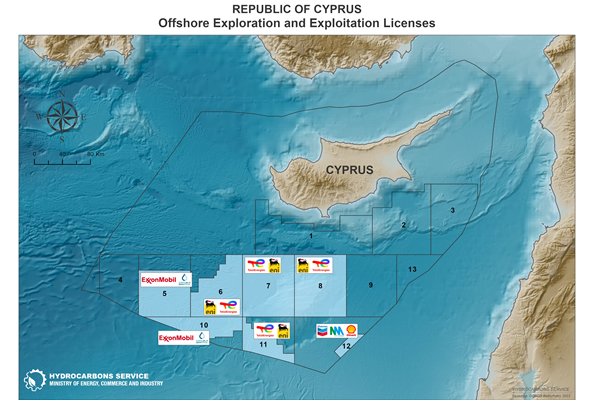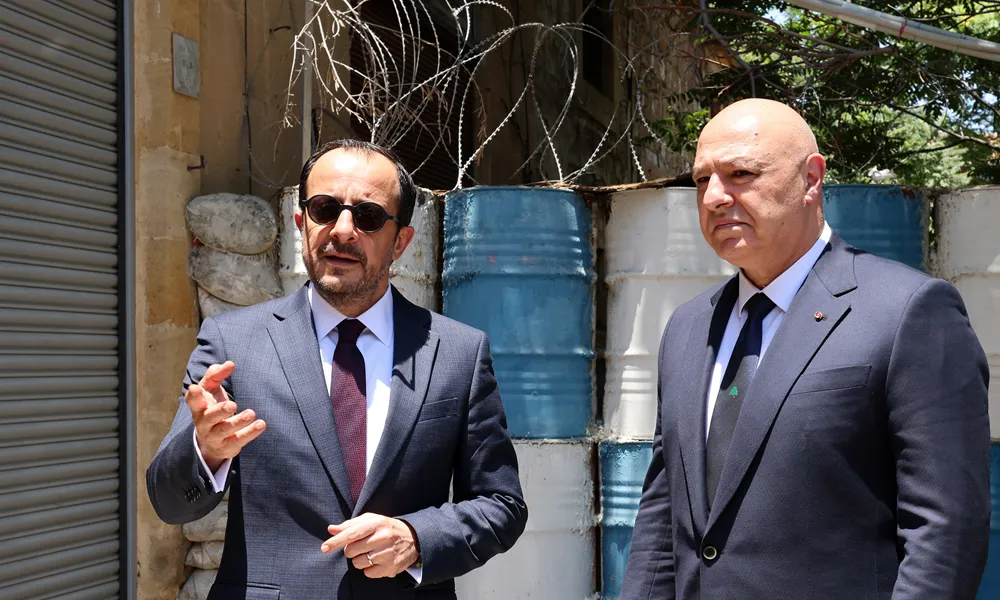The Lebanese cabinet approved a maritime boundary agreement with Cyprus on Thursday evening, taking a significant step towards ending a dispute frozen since 2007, while clearing the way for greater energy collaboration in the East Med region.
According to an official statement, the decision was taken in a cabinet meeting chaired by Lebanese President Joseph Aoun and in the presence of Prime Minister Nawaf Salam. To come into effect, the exclusive economic zone (EEZ) agreement requires ratification by the Lebanese parliament.
A second decision taken by the Lebanese government was to award an exploration and production licence for Block 8 in its EEZ to a TotalEnergies-led consortium including ENI and QatarEnergy.
Block 8 borders both Israeli and Cypriot economic waters, making the finalisation of maritime arrangements with Cyprus even more important for future hydrocarbon exploration in the region.
Cyprus-Lebanon EEZ and electricity interconnection?
Lebanese Minister of Energy and Water Joe Saddi said after the meeting that the next step must be to arrange a maritime delimitation agreement with Syria.
Saddi is due in Cyprus on November 10. According to sources, the agenda has yet to be set, though discussions could potentially focus on two main issues, the EEZ agreement, and a possible electricity interconnection between the two countries.
The delineation of the exclusive economic zones of Cyprus and Lebanon was initially negotiated between the two countries in 2007. With both countries signatories to the UN Convention on the Law of the Sea (UNCLOS), the median line methodology was used to delineate the boundary between their respective economic waters. However, the deal was never made official as ratification by Lebanon’s parliament remained pending.
Cyprus’ EEZ agreement with Israel in 2010 was not viewed favourably by certain quarters in Beirut, who questioned the validity of the Cyprus-Israel maritime boundary coordinates, specifically those that determined the connection point between the maritime waters of Cyprus, Israel and Lebanon. Reports at the time also suggested Turkey was exerting influence over elements of the complex power-sharing structures in Lebanon to prevent ratification.
On the back of political and economic turmoil in the country, Lebanon faced a deadly port explosion in 2020, felt as far as Cyprus. Struggling with a financial crisis and social unrest, Lebanon sought to attract international oil companies that would advance energy exploration in its waters. Possibly motivated by the need to create a stable and predictable environment, the unthinkable happened. Lebanon reached an informal maritime agreement with Israel – which it does not recognise – brokered by the United States of America in October 2022, solving a long-standing maritime dispute between the two neighbouring countries.
New government, improved relations
After two years without a government, and a crushing conflict between Israel and Hezbollah in 2024, President Joseph Aoun became Lebanon’s head of state in January 2025. The first foreign leader to visit and congratulate Aoun was Cypriot President Nikos Christodoulides. In July this year, Aoun returned the favour with an official visit to Cyprus. The two leaders also met on the sidelines of the UN General Assembly last month.
Given this backdrop and the awarding of an exploration licence to Total in Lebanon’s Block 8, the cabinet decision comes as less of a surprise. Specific details have yet to come out, however. It remains to be seen what adjustments have been made to the 2007 EEZ agreement, whether the Lebanon-Israel maritime agreement has been incorporated, or whether other changes have been made. The next important steps to look out for now are if, and when the Lebanese parliament will ratify the Cyprus-Lebanon EEZ agreement, and whether Syria will proceed with maritime delimitation agreements with Lebanon, Cyprus and/or Turkey.
"The step to ratify the two countries' maritime border is certainly a positive one, having been shelved for nearly two decades. The move provides clarity regarding any potential cross-border discoveries to TotalEnergies and its consortium partners Eni and QatarEnergy who have just been awarded Block 8 which borders Cypriot waters," Peter Stevenson, East Med analyst at MEES, told Politis to the point.

Island states’ maritime rights
On ratification, Cyprus will have three UNCLOS-based maritime agreements in effect – that is, following the median line methodology – with Egypt, Israel and Lebanon, strengthening its argument, particularly vis-à-vis Turkey, on the right of island states to give full effect to their maritime rights.
